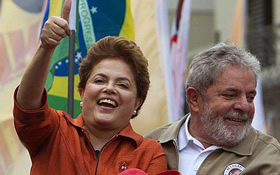
The elections are over in Brazil. Dilma Rouseff of the Worker’s Party (PT) comfortably won the Presidency, although the election had to go to a second round. She is Brazil’s first female president. Like most political leaders, she has been both praised and criticized. Dilma was handpicked by Lula to succeed his two term presidency. With Lula’s enviable popularity and over 80 percent approval rating few doubted her victory. It is too soon to make judgments on Dilma, as some have already done. Lula lost three elections before he was finally elected Brazil’s first working class President. He was also heavily criticized by Brazil’s elite before entering office. After 8 years of Lula it is difficult to intelligently argue that he was a failure or that Brazil is worse off. In fact, during his administration Brazil has managed to significantly decrease its disreputable level of inequality, long one of the world’s most unequal, while also managing to grow at an average rate of roughly 4% yearly. This year Brazil’s economy is set to grow at an astonishing 7.5%. During Lula’s tenure 28 million Brazilians rose out of abject poverty. The percent of people living in ‘misery’ decreased from 28% to 15% of the total population. This was mainly accomplished through massive government assistance programs. The upper class and wealthy have been dumbfounded with Lula and his policies because their conditions also improved alongside the poor and middle class. Some of Lula’s opponents claim his astonishing success was made possible by the fiscal policies of his predecessor, Fernando Henrique Cardoso. This is an ongoing debate, but one thing is certain, it was during Lula’s presidency that millions left abject poverty, inequality decreased and Brazil emerged as a major player on the world stage.
As an organization Mundo Real is impartial on most political issues. Individually we all have our personal political convictions, however, as a group we are interested in policies and practices that provide short term results, like those that during the Lula period, as well as development that is sustainable for future generations. Some have argued that much of Brazil’s recent growth is misleading, and that many historic social problems have been treated with Band-Aid like solutions and others by simply sweeping them under the rug for future generations to deal with. In this sense there might be reason to worry. Hopefully the Brazilian economy will continue to grow and millions more will be rise out of abject poverty. Can this occur without jeopardizing future generations? Will Brazil follow the unsustainable practices of the US and Europe by destroying much of the natural environment in the name of economic development. Only time will tell, so for now we wish the best for Dilma as Brazil’s first female President and hope she will continue many of Lula’s policies while also paying acute attention to more subtle forms of injustice that continue to occur, mainly at the local levels.
In Rio de Janeiro, incumbent Governor, Sérgio Cabral (PMDB) easily defeated Fernando Gabeira (PV) in the first run round of statewide elections. Cabral is considered a centrist politician and is quite popular with voters mainly for his combating favela based drug gangs and for other public security policies such as implementing UPPs (Units of Peacemaking Police). So far UPPs have been created in 13 favelas communities and there has been slight but important drop in the city’s crime rate. Cabral is also popular in certain communities for his participation in the PAC development program of the federal government, particularly for the implementation of UPAs, which are 24 hour health centers (not quite fully functional hospitals). He and Lula formed a tight and strategic partnership during the last couple of years. The UPPs now occupy 13 communities that were once dominated by drug trafficking factions. Many consider them a success and they have earned Cabral significant votes. Gradually, however, the UPP policy is receiving criticism, in some instances scathing (see Marcelo Freixo’s report; http://www.marcelofreixo.com.br/site/noticias_do.php?codigo=104). The main argument against the UPPs is that they are located in areas that serve the interests of the elite and the upcoming mega-events and not the city as a whole. It is also argued by some that they simply displace crime rather than resolve the root causes of it. UPPs have been created slowly over the past 2 years. It has take almost 2 years to install just 13 UPPs in 13 favela communities. Rio has roughly 1000 favelas and at this rate it would take several decades to reach all 1000 favelas. After the recent urban warfare in Rio’s North Zone, with the police and military occupying the Complexo do Alemão favela, support for UPP has again gained momentum.
Many would like to see them also installed in the dozens of favela communities that are controlled by Rio’s infamous mafia like militias, which are formed mainly of off duty or ex-police officers. The militias are often just as violent as the drug gangs and they are heavily involved in Mafia style extortion activities in the communities they dominate. That is, they charge small businesses and often home owners for protection. The militias do not allow drug trafficking or drug use (or other common crimes) in the favelas they control. Offenders are dealt with swiftly and forcefully. The militias, which have been referred to on occasion as the lesser of two evils (between them and the drug gangs), have a cozy relationship with some of Rio’s politicians. The militias also have close ties to many members of the Rio’s police. In return for displacing gangs from favelas and securing votes for certain politicians the militias are rarely targeted by the authorities. Many of the militia leaders have actually entered politics, becoming city council men and even state representatives, all the while controlling entire communities through fear, extortion and violence. Some militia leaders were arrested in the last few years but they continue to grow and these renegade cops will cause serious problems for future generations if something is not done to address them. The chart toping film Tropa de Elite II (Elite Troop II) that was just released in Brazil deals with this very issue. The film was ready for release months ago but was prohibited from showing until after Sérgio Cabral had secured his election victory. The recent wave of violence that shocked Rio in late November seems to be having a somewhat positive effect on the public’s view of UPPs. Time will tell if the policy is working. We will continue to cover it.
In terms of our community-based work Cabral and his administration have not been helpful. They have not been as aggressive as Eduardo Paes and the current municipal government, but they have nonetheless done little to stop his violent and unsustainable plans. In many cases Cabral has subtly supported the forced evictions.


You must be logged in to post a comment.